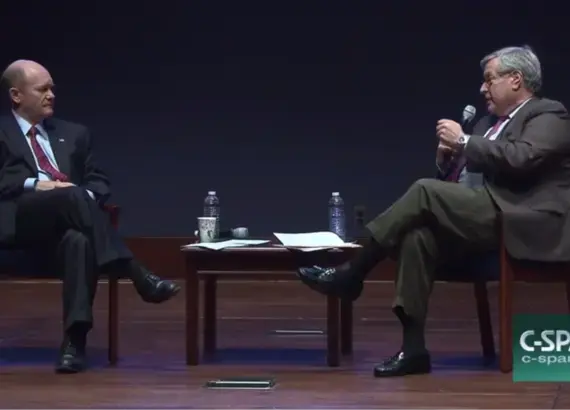
Success Story
Senator Chris Coons and NDI President Kenneth Wollack Discuss Impact of Democracy Assistance on Security
Senator Chris Coons (D-DE) and NDI President Kenneth Wollack spoke about the relationship between democracy and global stability during the second annual Capitol Hill National Security Forum, highlighting the fact that non-democratic societies are more likely to harbor terrorists, experience citizen displacement that results in refugee flows, and engage in violent conflict than their democratic counterparts.
“In this interconnected world,” Wollack said, “what happens inside countries doesn’t stay there. If our ultimate foreign policy objective is a world that is more humane, safe, peaceful and stable, then it is in our national interest that these countries become democratic.”
Senator Coons – a member of the Foreign Relations and Appropriations committees, and a strong supporter of international democracy assistance – led the discussion. During the 30-minute conversation, Coons and Wollack discussed some of the important democratic gains being made around the world, noting that in Armenia, Ethiopia, Guatemala, Malaysia and Slovakia citizen pressure for more open, inclusive and representative government has led to promising reforms.
In this interconnected world, what happens inside countries doesn’t stay there. If our ultimate foreign policy objective is a world that is more humane, safe, peaceful and stable, then it is in our national interest that these countries become democratic.
- NDI President Kenneth Wollack
The Senator – who recently travelled with a bipartisan congressional delegation to four African countries – said that grassroots action and public demonstrations in Burkina Faso prevented a coup that would have rolled back the country’s hard-won democratic gains, while a combination of multilateral action and citizen pressure in The Gambia “helped ensure that the long-overdue departure of the Gambian leader actually happened.”
Both examples show that while national security and intelligence partnerships in key regions like the Sahel can help push back on extremism and terrorism, investments in democracy and democratic development pay real dividends and help produce meaningful outcomes.
“My impression,” Coons said, “is that in West Africa, in just the last decade, we’ve seen the single greatest movement consistently in favor of democracy on the continent in the last fifty years.”
However, both Senator Coons and Mr. Wollack also acknowledged that there has been a global regression of democracy over the past decade. Wollack outlined three key factors that have contributed to this backsliding. “One is that authoritarians are learning how to maintain their grip on power – and now they’re talking to one another,” he said. “There’s a community of autocrats today, and that was not the case twenty years ago. They’re learning how to clamp down on their own citizens to maintain a firmer grip on power. And secondly, there is a challenge in new democracies. They inherit the legacy of their predecessors – crime, corruption, poverty – and if institutions don’t deliver on the promise of democracy one of two things happen: either people go to the streets, or they vote for Hugo Chavez. They’ll vote for a populist leader who tries to provide an easy answer. And now technology is creating promise, but we’ve also seen the darker side of technology, which autocrats are using more effectively.”
The wide-ranging conversation also touched on topics including Russian election interference, China’s increasing assertiveness around the world, and Americans’ support for democracy promotion as a key element of U.S. foreign policy.
The day-long bipartisan forum featured a number of other high-profile participants, including Homeland Security Secretary Kirstjen Nielsen, Florida Senator Marco Rubio, representatives from the U.S. Military and NGO community, and members of both houses of Congress. The event, which organizers said aimed to “gather national leaders and key stakeholders to address our nation's security and discuss ideas and policies for improving U.S. defenses at home and abroad,” was sponsored by Senator Coons, Senator Rubio (R-FL), Homeland Security Committee Chairman Michael McCaul (R-TX) and Congressman Dutch Ruppersberger (D-MD). The audience for the security briefing was comprised largely of Congressional staffers, federal agency employees and press.
